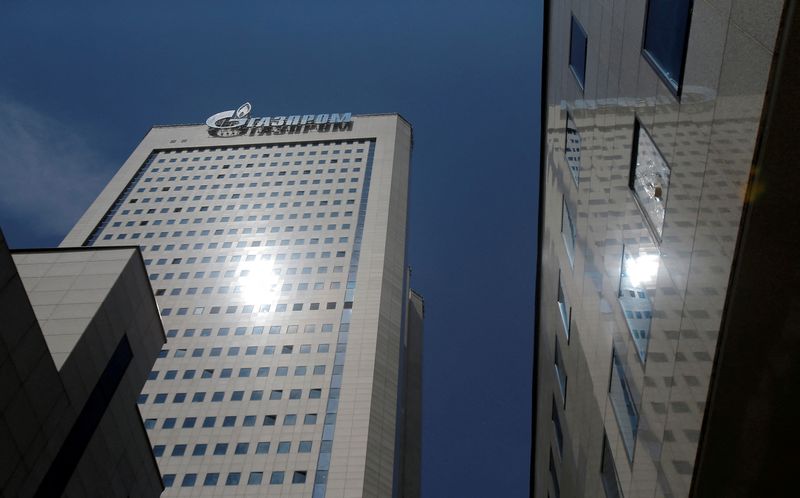By Darya Korsunskaya and Alexander Marrow
LONDON (Reuters) - Russia's war in Ukraine is draining state coffers, but the fiscal buffers Moscow has built up over the last two decades will be enough to last for years, even if oil prices slump as low as $60 a barrel.
The liquid part of Russia's National Wealth Fund (NWF) has more than halved, falling by $58 billion since the February 2022 invasion of Ukraine, as the government used the money to finance its budget deficit and support state-owned companies.
The NWF, a rainy-day fund of accumulated energy revenues, held $55 billion, or 2.7% of gross domestic product (GDP), as of Feb. 1, 2024, down from $112.7 billion, or 6.6% of GDP, as of Feb. 1, 2022, according to finance ministry data.
Along with around $300 billion of Russia's reserves immobilised in the West, the data suggests that sanctions against Moscow and Russia's military spending spree are reducing President Vladimir Putin's financial muscle.
"It seems to me that we are already at the point where there is a feeling that there is not enough money, more is needed," said Sofya Donets, chief economist for Russia & CIS at Renaissance Capital.
With the finance ministry planning to spend 1.3 trillion roubles on budget deficit spending this year and around another 900 billion roubles on companies and investment projects, the amount of available funds is dwindling.
In 2023, the finance ministry spent 3.46 trillion roubles from the NWF to cover the budget deficit and over 1 trillion roubles elsewhere.
"The NWF has a margin of safety, but we must understand that it is not infinite," said Donets. "If the price of oil is not $65 per barrel, but $60, another trillion (roubles) will need taking from the NWF."
CentroCreditBank economist Yevgeny Suvorov said oil prices at $50 a barrel this year would deduct up to another 2 trillion roubles from Russia's reserves.
"In this scenario, we will approach the exhaustion of reserves at the start of 2025," Suvorov said. "Simply put, Russia no longer has insurance against low oil prices."
SAFETY MARGIN
Brent crude prices are currently trading at around $82 per barrel and Russia's Urals crude trades at around $74 per barrel, showing no signs of an imminent slump. Russia's finance ministry even hopes to replenish the NWF by around $20 billion this year.
Even at $60 a barrel, Russia can retain a safety margin, possibly for years, said Dmitry Polevoy, head of investment at Astra Asset Management, though NWF investments in projects that swell the fund's illiquid assets leave less wiggle room should commodity prices fall.
The fund's illiquid part consists of deposits in state banks, investments in stocks, corporate bonds and other investment projects. In two years, illiquid assets have risen to 59% of the fund from 38%, up to $78.6 billion.
Of those almost 7 trillion roubles, about 3.1 trillion roubles are the state's stake in dominant lender Sberbank, with 1.5 trillion roubles in other company stakes, such as VTB (MM:VTBR), Gazprombank
But the finance ministry could raise funds from central bank repo auctions in exchange for illiquid assets, said Polevoy.
"In other words, the status of an 'illiquid' asset de jure does not mean that it is impossible to use it de facto in the short-medium term," Polevoy said. "The budget will always be able to receive roubles from the central bank for the NWF's 'illiquid' assets, regardless of their status."
NO TALK OF CRISIS
Russia's fiscally conservative authorities tend to be wary of rocking the boat. Finance Minister Anton Siluanov in December said his ministry was not prepared to take the NWF to zero and "sit without a kopeck in reserve".
"If we see the (NWF) balance decreasing, we will take other measures to balance the budget," Siluanov said, implying reduced expenditure.
Thinking that Russia might quickly run out of reserves is misleading, said Elina Ribakova, senior fellow at the Peterson Institute for International Economics and the Kyiv School of Economics (KSE) pointing to Moscow's efforts to shrink budget deficits and siphon off oil revenues since 2014.
"They did a lot of homework to prioritise the war over social spending and produce a more severe fiscal adjustment than needed to insulate, or isolate, itself from pressure from the West," she said.

"Oil prices at $80 is extremely comfortable for Russia," she said. "Maybe at $60-$70 it starts feeling the pinch, but we cannot start talking about crisis if Russia is selling oil at $60 or above."
($1 = 91.5455 roubles)